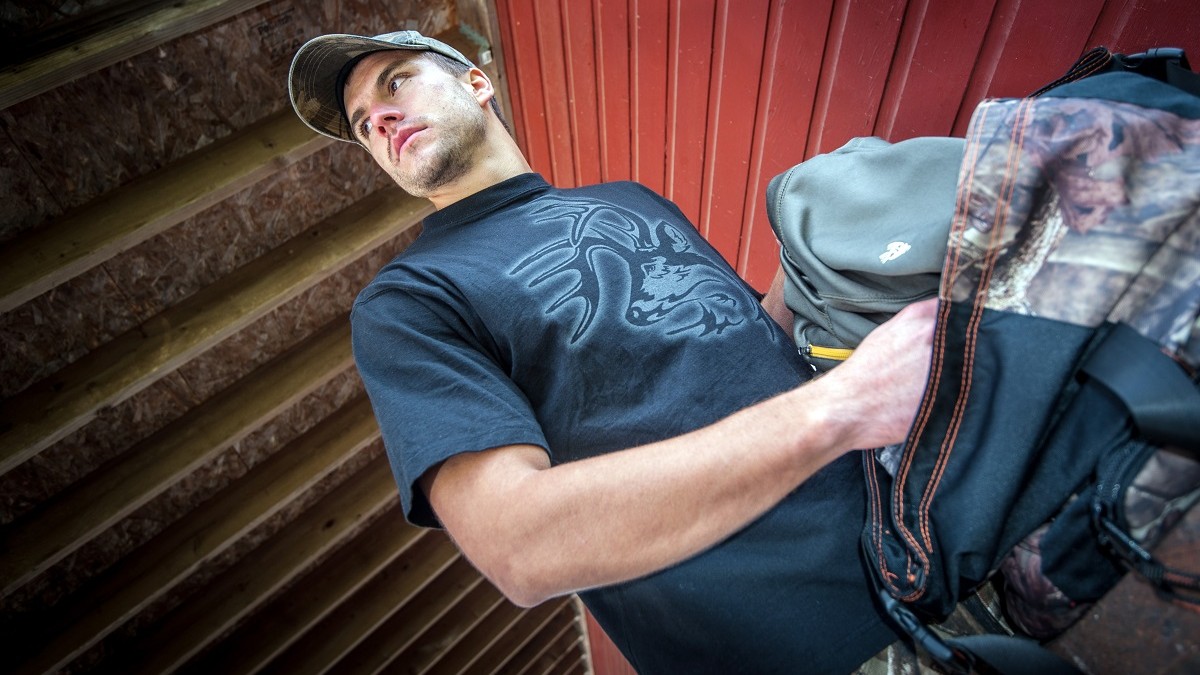The Program
Scent-control is one of the most talked about strategies when it comes to hunters preparing to hit the woods. With emerging technology and new products hitting the shelves each season, companies are trying to keep up with the demand of hunters.

Scent control and excellent stand placement can lead to more scenes like this.
Why the craziness surrounding scent-control?
There are very obvious reasons why scent control is important and ‘popular.’ Research has told us deer can smell anywhere from 100 to 1,000 times better than the human nose. So there’s your answer, scent control is important because deer have an unbelievable sense of smell. If hunters (especially archers hunting from a stand) intend to get close, they must reduce some human odor. Today’s companies fully understand this, so they create and market their products through celebrities and television shows to garner attention. From Scent-lok to Scentblocker, Nose Jammer and Ozonics, the influx of products can be intimidating and confusing to new, as well as seasoned hunters. It begs the question, what is necessary to get close to game in order to harvest them? The answer isn’t a simple one and it requires preference, budgeting and trial and error.
Necessary Products
The clock had struck noon and the action was starting to pick up. After a slow cold morning, the morning chill gave way to a whitetail filled afternoon. After seeing a couple of antsy does buzzing around a ridge top, I figured something with antlers wasn’t far behind. I was right on, as a solid ten point followed a doe off the ridge top into the ‘bowl’ I was overlooking. Right away I knew I didn’t want to harvest the buck, but I was curious to see where they were headed and why. I’ll admit I didn’t put forth my best scent control effort for that afternoon hunt, but the parts of my program I did follow would’ve provided me with venison had I squeezed the trigger on my Model 700. Prior to almost all my hunts, I shower with scent-free soap, have my clothes washed and stored away, use scent-free deodorant and spray all my clothes just prior to hitting the woods. The one thing I didn’t do before that particular afternoon hunt was shower, although I did shower before my morning hunt that day. After eating lunch and nabbing a few jerky sticks to go, it was probably the odor of my breath that stopped the buck dead in his tracks when he caught my scent stream. Even after he caught my scent and matched his eyes with what his nose was telling him, it was too little-too late, he was easily in range and I was scoping him head to toe. Although I gave him a pass, my scent control program had done its job by allowing for a harvest opportunity. Could I have gotten this close to him without showering, washing my clothes or spraying down? It was a breezy day, so probably not. That buck was one of thirty-four deer I saw during last years gun opener, and the only one to scent me.
In another situation, my program was followed carefully and no payoff occurred. Before a late afternoon October bow hunt I showered, eliminated breath odor, and sprayed all clothing and equipment just prior to the hunt. For this particular hunt I had a climbing stand setup, which allowed me to reach about twenty-three feet up in a tree overlooking multiple ridge-top travel routes. With a cold front in progress and recently picked corn in sight, I was primed for a great sit. Not twenty minutes on stand, my eye caught a dandy buck most likely cutting the tracks of previous doe travel. I felt confident as the wind was in my favor and I could see the buck slowly moving through the timber working my way. Then all of the sudden wind direction began to shift and I could countdown the seconds to when I knew my scent was going to reach his nostrils. By the time I hit ten, he had a bead on me and the hunt was over. The next thirty seconds that followed were full of stomping, only to be finished off with a grand blow to alert anything and everything. I had done all I could prior to the hunt to eliminate scent, but the whitetail nose proved to be too much.

Winds tend to swirl in rolling farm country, making scent control even more critical.
Research has shown when wind direction, humidity and temperature are just right, whitetails can detect scent from at least 400 yards away (Alsheimer, 2006). Taking this into consideration, when a deer catches our scent, the deer needs to be fooled into thinking what he smells is days old instead of a recent or immediate scent. There are many great ways to fool a deer’s nose through clothing, sprays and other technology. On my makeshift, ‘days old scent’ spectrum, if a hunter is wearing scent reducing carbon clothing, washing all clothes, storing them, spraying clothes before hunting, showering and controlling breathe odor, a hunter is most likely getting deer to think his or her scent is a few days old. Bow-hunters who don’t follow any program at all are risking a lot, it’s a risk I’m not willing to take. At minimum, I believe hunters should shower and spray clothes before every hunt. I’ll admit, before I started following my scent control program, I killed a few good bucks that never had a clue I was there. If you have the right wind, good stand placement and spend hours upon hours in the woods, without a doubt you’ll collect some dandy bucks, but I feel great about my program and I’m confident it has allowed me to get closer to deer more times than not.
Summing it all up
Clearly, whitetails are survival machines that rely on their nose to reach old ages. If you’re new to hunting or hoping to even the score a bit against the whitetail, consider hitting the ‘scent’ isle at your local retailer. The most successful hunters use a program to reduce scent in order to get close to older, wiser deer.
So let’s hear it below, what forms of scent control do you practice?






